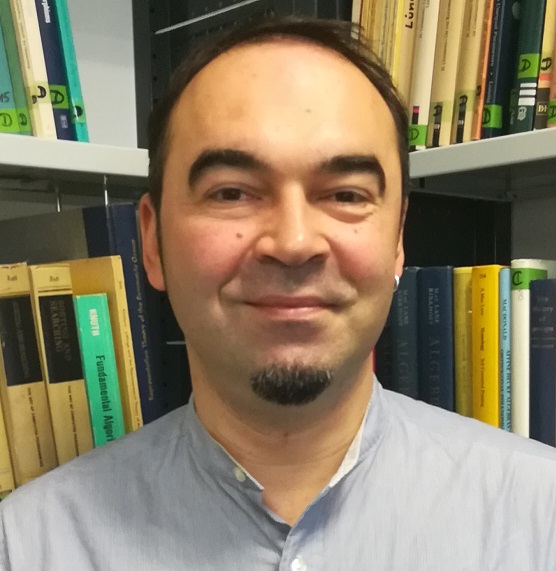 |
|
|
|
|

|
Forschung
|
|
|
|
|
|
|
|
|
|
|
|
|
|
|
|
|

|

|
Noncommutative computer algebra

|
I am interested in Gröbner bases and their
applications in different noncommutative structures - free and path algebras,
iterated Ore extensions, algebras with PBW bases.
In my research I continue the research line, initiated by
Kandri-Rody, Weispfenning (algebras of solvable type),
Apel (G-algebras) and Gomez-Torrecillaz, Lobillo et.al. (PBW algebras).
Gröbner bases for these algebras
and many important algorithms, based on them (like Gröbner basics)
have been implemented in the computer algebra system
SINGULAR
:
PLURAL
.
Future plans include partial Ore localizations of G-algebras.
See my publications for more details.
|
|

|
Noncommutative algebra

|
G-algebras, introduced by Joachim Apel, appear in a variety
of situations, coming from the different fields of science.
I refined this class, calling G-algebra (resp. GR-algebra) direct generalization
of commutative ring in n variables (resp. commutative ring or its factor ring).
I discovered the necessary and sufficient conditions for a
G-algebra to have a PBW basis and gave new simple proofs
for e.g. noetherian and integral properties of them.
|

|
One of the important algorithms, which has no analogue in the commutative algebra,
is the preimage of a left module under a morphism between two non-commutative
algebras. It has been designed and implemented, there are important applications
of this algorithm to different problems in mathematics.
|
|

|
Algebraic Systems and Control Theory

|
The module--theoretic approach to problems of
Systems and Control Theory provides a possibility
to apply algorithms of Computer Algebra and of
constructive Homological Algebra. In cooperation
with Eva Zerz (Aachen), we study various problems,
arising in Systems and Control Theory. In particular,
a
SINGULAR
library control.lib was created. See
more details on the project at Control Library In Plural and Singular (CLIPS) .
|

|
Another interesting library, implemented in the framework of
the project is involut.lib. The procedures
of this library can compute the set of involutions
(that is, involutive antiisomorphisms) of a given non-commutative
polynomial algebra.
|

|
We are working further on generalizing the results and algorithms
to the non-commutative Ore algebras and, in general, to
partial Ore localizations of G-algebras.
|
|

|
Symbolical and Numerical Computation

|
With Bernd Martin (Cottbus), we are working on symbolic methods
for (systems of) linear partial differential equations.
Our current computational framework consists of
SINGULAR
library, MATHEMATICA built-in functions and an interoperability package between MATHEMATICA and
SINGULAR
. The forthcoming paper describes the ideas behind this framework. In particular, one can efficiently perform the following tasks:

|
based on given formulas for approximations, generate a finite difference scheme for an equation (a system of equations) |

|
analyze a given scheme for von Neumann stability and
obtain conditions for stability |

|
analyze a given stable scheme for its dispersion |
|
|

|
Representation Theory of Algebras

|
There are many problems in representation theory of algebras, requiring
intervention from the computer algebra side. Some of them
are really hard (and thus, interesting). Some of them could not be solved
algorithmically (thinking in a classical sense of the "algorithm" paradigm).
Here are some algorithms I am interested in:

|
Maximal two-sided ideal in a given left ideal (for computing
e.g. the annihilator of a left module)
|

|
Test for the maximality of a given left ideal (equivalently,
test for the simplicity of a left module)
|
In my dissertation (2005, available online, see publications ),
there are some results on these and other topics. In particular, one is
able to compute the good approximation of the annihilator of a left module for so-called
holonomic modules.

|
Together with O. Khomenko (Freiburg) we developed an algorithm
for computing the Central Character Decomposition of a left
module. It is implemented in the library ncdecomp.lib, distributed
with
SINGULAR
:
PLURAL
since 2003.
|
|
|
|







